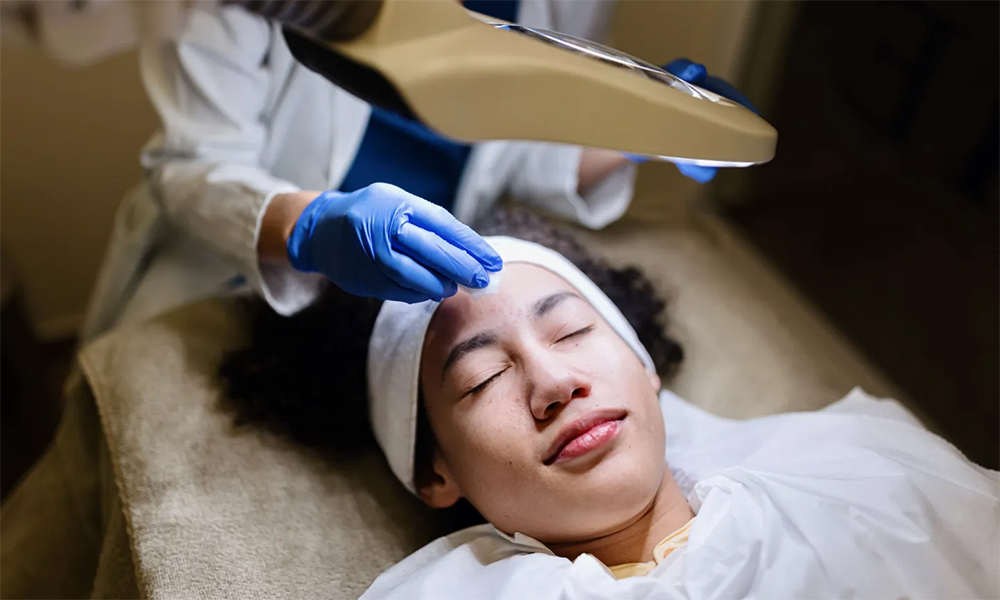
美国整形外科协会(American Society of Plastic Surgeons)的最新数据显示,2023年,13至19岁的青少年接受非手术医美项目的数量突破26万例。这表明许多家长支持子女这样做。周一发布的密歇根大学医学院C.S.莫特儿童医院(University of Michigan Health C.S. Mott Children’s Hospital)全国儿童健康调查结果证明了家长的态度转变。
在989名青少年家长中,研究人员发现,六分之一的家长认为应该允许青少年接受医美项目,他们明确同意子女以任何理由接受皮肤填充、化学焕肤、激光脱毛、牙齿美白等项目。
同时,有51%的家长支持青少年在有正当理由时接受非手术医美项目,但他们对“正当性”的标准存在差异。有37%的家长认为,通过医美项目改善青少年的心理健康是一个合理的理由,有33%的家长认为,特殊场合或容貌焦虑是正当理由。有30%的家长认为应对霸凌是正当理由。
在决定是否允许子女接受医美项目时,家长会考虑的重要因素包括机构或项目的健康安全评级(76%),儿童医疗保健提供者的建议或批准(57%),以及青少年希望接受项目的理由(55%)。
家长反对接受这类医美项目最主要的原因包括:
• 感觉没有必要(64%),或担心未来后悔(57%)
• 担心子女提出这类要求表明存在自尊/心理健康问题(55%)
• 成本问题(52%)
• 子女会希望继续接受医美项目(49%)
• 感染或留疤风险(44%)
最后,关于非手术医美项目的最低年龄限制,家长们的观点如下:35%的家长认为最低年龄应为18岁以上;21%的家长接受18岁门槛;27%的家长认可16至17岁,17%的家长认为15岁以下也可以接受非手术医美项目。
调查的共同负责人、儿科医生苏珊·伍尔福德博士在新闻稿中指出,社交平台上理想化的面容和身材,使医美项目日益流行。她表示:“在自然情况下,无法达到社交平台上经过数字修饰的‘完美形象’,这正在加剧青少年对自身容貌的不安全感。当孩子们将网络点赞量等同于自我价值时,问题会变得更加严重。”
她补充道,家长需要引导孩子了解媒体制造的视觉幻象,并审视他们改变外貌的真实动机。
她表示:“当孩子要求接受非手术医美项目时,家长应该考虑孩子的情感和心理健康问题。”
她还强调:“了解青少年对于医美项目改变容貌的看法,以及他们希望这种改变如何影响他们生活的其他方面,是有帮助的。比如,有些孩子期待通过医美项目迅速提升社交人气,或者交到更多朋友。但改变外貌并不能保证实现预期的结果或者改变人生境遇。”(财富中文网)
译者:刘进龙
审校:汪皓
美国整形外科协会(American Society of Plastic Surgeons)的最新数据显示,2023年,13至19岁的青少年接受非手术医美项目的数量突破26万例。这表明许多家长支持子女这样做。周一发布的密歇根大学医学院C.S.莫特儿童医院(University of Michigan Health C.S. Mott Children’s Hospital)全国儿童健康调查结果证明了家长的态度转变。
在989名青少年家长中,研究人员发现,六分之一的家长认为应该允许青少年接受医美项目,他们明确同意子女以任何理由接受皮肤填充、化学焕肤、激光脱毛、牙齿美白等项目。
同时,有51%的家长支持青少年在有正当理由时接受非手术医美项目,但他们对“正当性”的标准存在差异。有37%的家长认为,通过医美项目改善青少年的心理健康是一个合理的理由,有33%的家长认为,特殊场合或容貌焦虑是正当理由。有30%的家长认为应对霸凌是正当理由。
在决定是否允许子女接受医美项目时,家长会考虑的重要因素包括机构或项目的健康安全评级(76%),儿童医疗保健提供者的建议或批准(57%),以及青少年希望接受项目的理由(55%)。
家长反对接受这类医美项目最主要的原因包括:
• 感觉没有必要(64%),或担心未来后悔(57%)
• 担心子女提出这类要求表明存在自尊/心理健康问题(55%)
• 成本问题(52%)
• 子女会希望继续接受医美项目(49%)
• 感染或留疤风险(44%)
最后,关于非手术医美项目的最低年龄限制,家长们的观点如下:35%的家长认为最低年龄应为18岁以上;21%的家长接受18岁门槛;27%的家长认可16至17岁,17%的家长认为15岁以下也可以接受非手术医美项目。
调查的共同负责人、儿科医生苏珊·伍尔福德博士在新闻稿中指出,社交平台上理想化的面容和身材,使医美项目日益流行。她表示:“在自然情况下,无法达到社交平台上经过数字修饰的‘完美形象’,这正在加剧青少年对自身容貌的不安全感。当孩子们将网络点赞量等同于自我价值时,问题会变得更加严重。”
她补充道,家长需要引导孩子了解媒体制造的视觉幻象,并审视他们改变外貌的真实动机。
她表示:“当孩子要求接受非手术医美项目时,家长应该考虑孩子的情感和心理健康问题。”
她还强调:“了解青少年对于医美项目改变容貌的看法,以及他们希望这种改变如何影响他们生活的其他方面,是有帮助的。比如,有些孩子期待通过医美项目迅速提升社交人气,或者交到更多朋友。但改变外貌并不能保证实现预期的结果或者改变人生境遇。”(财富中文网)
译者:刘进龙
审校:汪皓
Increasingly, teens age 13 to 19 are getting non-surgical cosmetic procedures—over 260,000 in 2023, according to the most recent data of the American Society of Plastic Surgeons. That suggests lots of approval from parents—something confirmed recently through a national sampling of parents through the University of Michigan Health C.S. Mott Children’s Hospital National Poll on Children’s Health, which released findings on Monday.
Through the survey of 989 parents of teens, researchers found that one in six believe teenagers should be allowed, with explicit parental approval and for any reason, to receive such aesthetic treatments—including derma fillers, chemical skin peels, laser hair removal, and teeth whitening.
Just over half of parents (51%), meanwhile, support teens getting non-surgical cosmetic procedures only if there’s a valid reason—though their beliefs differ about which reasons are valid. Getting a procedure to improve the teen’s mental health is something 37% view as a good reason, while 33% think that either a special occasion or feeling self-conscious is a valid reason. Being bullied is a valid reason according to 30% of parents polled.
Very important things to consider when making such a decision as a parent would include the health and safety ratings of the provider or procedure (76%), advice or approval from the child’s healthcare provider (57%), and their teen’s reason for wanting the procedure (55%).
Parents’ biggest reservations about approving such procedures would include:
• Feeling that their teen doesn’t need it (64%) or may have future regrets about it (57%)
• Concerns that such a request would indicate self-esteem or mental health problems (55%)
• The cost (52%)
• That their teen will want to continue getting procedures (49%)
• Risks of infection or scarring (44%)
Finally, regarding what the minimum age for non-surgical cosmetic procedures should be, parents had the following beliefs: 35% said anyone getting these procedures should be over 18; 21% said 18 should be the limit; 27% said 16 to 17 was old enough; and 17% said younger than 15 would be okay.
Dr. Susan Woolford, Mott Poll co-director and pediatrician, said in a news release that the increased popularity of such procedures may be due to social media’s idealized images of faces and bodies. “Teens are susceptible to feeling insecure about their appearance when compared to digitally altered pictures depicting an appearance that is probably unattainable naturally,” she said. “This problem is exacerbated by the pressure to post pictures of themselves to garner validation.”
Woolford added that it’s important for parents to find ways to help teens understand the distortions presented in the media and to also analyze their own reasons for wanting to change their appearance.
“If a teen asks for a non-surgical cosmetic procedure, parents should consider the emotional and mental health implications,” she said.
“It’s helpful to understand teens’ perceptions of how a procedure will change their appearance and the ways in which they hope it will impact other aspects of their life,” she added. “Some teens may view these procedures as a quick fix that will help them become more popular or gain friends for example. But changing your appearance doesn’t guarantee desired outcomes or that it will change your life.”






